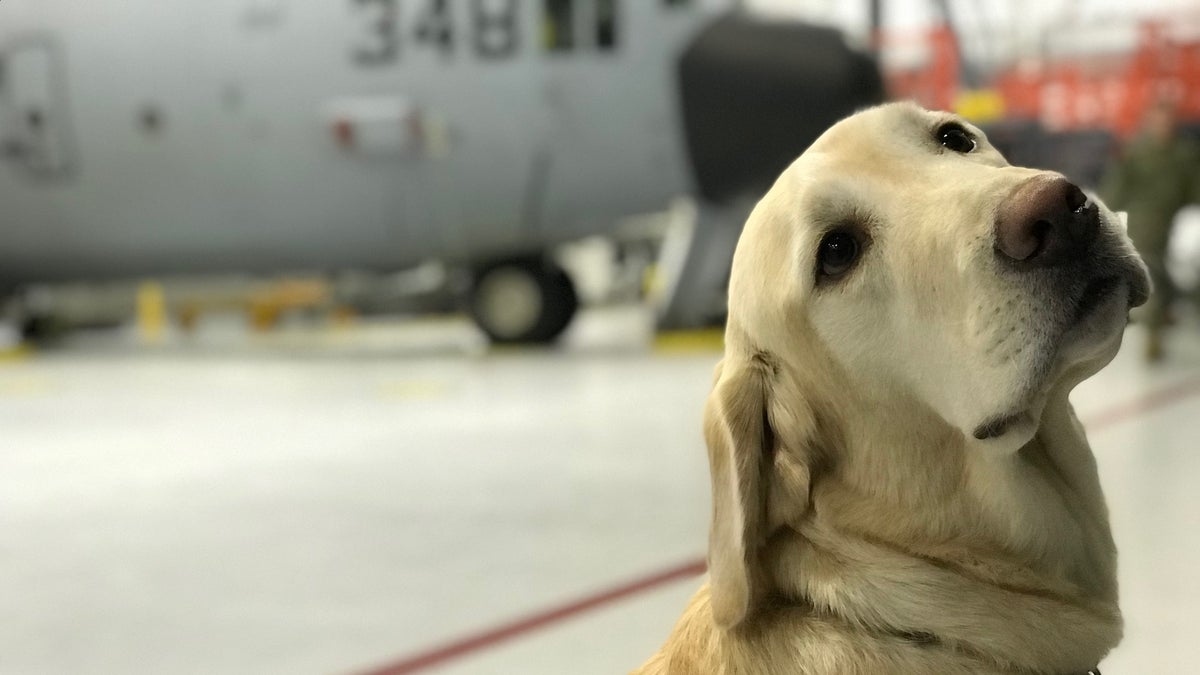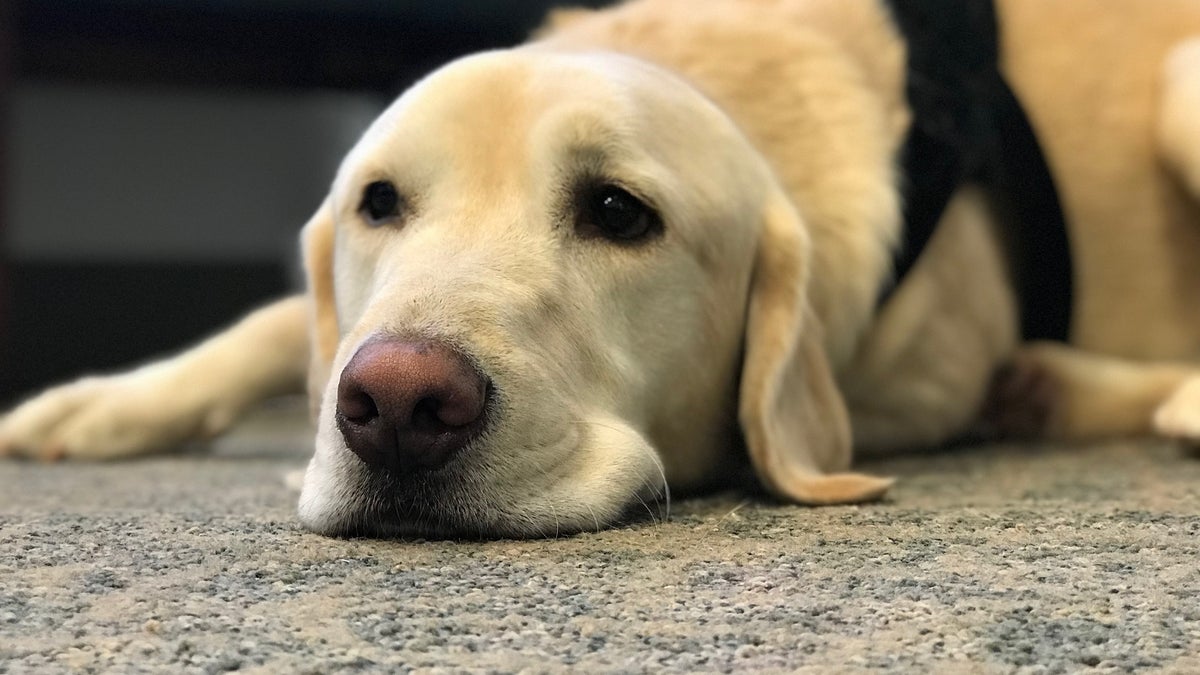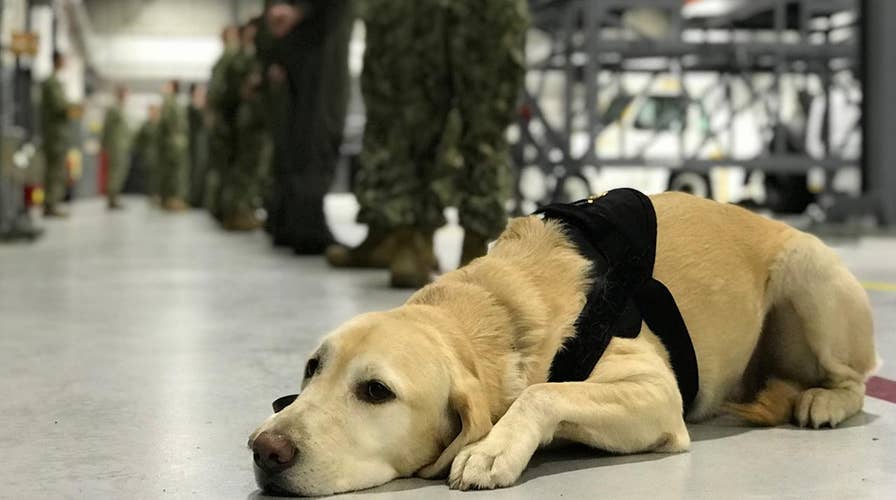Navy base uses stress dog to prevent suicide among its ranks
Suicides across the military have steadily increased since 2013 according to the Department of Defense. But a naval clinic on Joint Base Andrews has a secret weapon that can sniff out members dealing with extreme stress.
Every day, Senior Chief Brad greets sailors and marines as they enter a military clinic for their regular doctor’s appointments. Throughout the day, he makes his rounds and visits patients sitting in the waiting area, cuddling with them briefly. If he senses they are down, he takes action.
But he’s no medical professional. He’s a golden retriever yellow lab mix initially trained as a seeing-eye dog, a post-traumatic stress disorder therapy dog and, now, a stress dog.
As suicides across the military have steadily increased since 2013, according to the Department of Defense (DOD), a naval clinic on Joint Base Andrews in Maryland has found a secret weapon to sniff out military members dealing with extreme stress – a dog.
When Senior Chief Brad senses someone is down, he instantly alerts his handler, Chief Bobby Long. Long, a medical technician, counsels the patient to figure out if they need professional help.

Sr. Chief Brad posing for the camera in Hangar 12 on Joint Base Andrews. (Fox News)
“People that need a little extra attention or are maybe showing signs of irritability, stress, depression, whatever it could be; he will really focus in on that person and then he wants my attention,” Long said. “Some of the science behind that shows that dogs can pick up on pheromones that people emit when they are highly stressed and some science points to body language, cues that people leave.“
There are only 29 dogs across the country with this ability, according to Kim Hyde, a manager with Southeastern Guide Dogs.
“Just kneeling with Brad, rubbing his ear, watching his tail wag, it rejuvenates me. It reminds me of what’s important in life."
“Dogs like Senior Chief have actually helped service members who have seen too much and that have come back with emotional scars,” Naval Air Facility-Washington (NAF-W) commanding officer Capt. Robert Coogan told Fox News.
Coogan is responsible for coordinating the well-being of the 4,000 service members based at Joint Base Andrews. He has seen firsthand the impact an anti-stress dog has on sailors.
“Chief Brad has helped hundreds of sailors on JBA, not only with small day-to-day interactions. But there has been three cases specifically on the Navy side that have dealt with severe stress, combat deployments and the incidents that have really hit to the heart of readiness of the units: tragic events, accidents, suicides or combat deployments or situations regarding family members,” Coogan said.
For more than two years, Chief Brad and his handler have worked with sailors and marines in medical facilities on JBA and across Washington, D.C. metro area.

Senior Chief Brad taking a break in the Navy Detachment-Malcolm Grove Medical Center patient waiting area. (Fox News)
“It’s rare. I think most dogs have the ability to pick up, read people’s emotions better than humans do. But to get a dog that pick up on it and act on it…that’s the hard part,” Long said.
Long and his anti-stress dog also make “house calls” to units around the base to provide emotional support to anyone who is having a bad day.
“Just kneeling with Brad, rubbing his ear, watching his tail wag, it rejuvenates me. It reminds me of what’s important in life,” Navy Commander Damon Hildebrand told Fox News.
He also offers puppy therapy to members of a unit trying cope with a traumatic event, like suicide.
“(What) Brad does for us is…he lifts us to a higher level. He lifts us to a place where we can heal effectively, take our mind off that stress even just momentarily, enabling us to heal in a proper manner, a healthy manner,” Hildebrand said.
Luis Glinton, a Navy hospital corpsman, said Brad helped him with a change in his career.
“Facing a transition period in my life (going from military to civilian world involuntarily), and pretty much an emotional wreck, Brad helps lift up my spirits just by being around and allowing me to pet him,” Glinton wrote in a letter to Fox News.
Navy Chief Sean Gregar is an aviation support equipment technician. He said Brad helped him deal with the stress of going to the doctor’s office.
“I really don't like hospitals, but when you walk through the door and see Brad there is an instant feeling of happiness that overcomes you,” Gregar wrote to Fox News. “Plus, it is also a good time playing fetch with him down the hall and watching him run into people to get his ball!”
The duo will be retiring in May and taking their services to Kosovo to work with the Department of State and other military branches.
“It’s more of an emotional bond that’s really unique in what a dog can provide,” Coogan said, “and we look to expand this program not only with the branch medical clinic here at JBA but across the Navy fleet.”

